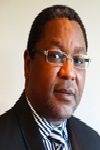
What is your political background? How did you come to join your political party and become an MP?
I was born and bred in a place that had a great political leader at Inanda, Ohlange. As is public knowledge, Mr John Langalibalele Dube was the first President of the ANC. He also did a lot more like being the first black person to have built a comprehensive school from grade R to grade 12. In 1976 I was at Ohlange Primary School when high school learners came and fetched us from classes and we went to participate in the nationwide student uprisings against the compulsory medium of instruction which had been made Afrikaans at the time in government schools in South Africa. That was when I was introduced to politics.
Things such as the Group Areas Acts where if you lived in kwaMashu and you wanted to go into Durban, you had to have special dispensation and if found in the Central Business District (CBD) after 20:00 you would be arrested, crystallised for me what apartheid was.
I read for a theological qualification at the Presbyterian Church where I was ordained as a pastor. It was there whilst we pushed liberation theology that I managed to get to university and majored in liberation systematic theology. At the time of the formation of the South African Students Congress (SASCO) at the University of KwaZulu-Natal (UKZN) from 1992 to1994, I played a major role such that I was elected into the Students Representative Council (SRC).
As an ordained pastor I was referred to as ‘Comrade Pastor’ and the congregation’s church building at Ntuzuma kwaMashu unfortunately got burnt to the ground by the IFP because of the clashes between the IFP and the ANC at the time. We used theology at the time as a tool to conscientise citizens to the injustice of the apartheid system, together with Pastors Alan Boesak and Frank Chikane.
Post 1994 I served as a branch secretary and chairperson for two terms in Pietermaritzburg in ward 24. In 1996 I started participating in workers’ struggle politics as a municipal employee within the South African Municipal Workers Union (SAMWU). I was elected shop steward and then became regional treasurer and provincial chairperson for SAMWU between 1996 and 2003. Being chairperson of a province in SAMWU meant that one also was in the Provincial Executive Committee (PEC) of COSATU. I also have been a provincial chairperson of the South African Civic Organization in KZN from 2004 until 2008. In 2008 I was elected Deputy Secretary-General and as the Secretary-General of SANCO in 2014. Having been on the ANC national list since 2009, as Members left Parliament and other passed on, the list process eventually reached my name which is how I got to Parliament.
What does your job as an MP entail?
Between Tuesday and Friday mornings I attend committee meetings between of the portfolio on transport and that of the Auditor-General. My afternoons, Fridays and Mondays are dedicated to SANCO as I remained it Secretary-General.
What are you finding most challenging about the Fifth Parliament?
Though I have intergovernmental relations (IGR) experience, I find committees a different terrain altogether. Law making had been a learning curve as Parliament is more regulated in terms of discipline.
Does Parliament do a good job of holding the Executive to account? If not, what can be done to improve this?
Yes I am satisfied we have been doing an adequate job. As Parliament is maturing and MPs no longer see Parliament being accountable to the Executive, the roles have been better defined and assigned. Democracy is also maturing as debates have become robust since the Fifth Parliament.
Are you happy with the proportional representation system or are you in favor of electoral reform?
Proportional representation is adequate as South Africa’s democracy is quite young.
Is Parliament’s public participation model adequate/ robust enough that it affords enough public participation before a law is passed?
I think the onus is on civil society organisations including SANCO to be at the forefront of civic education. Although we get time to consult on bills, civil society and provincial and local government has to fill the gap by bringing the information to the people and encourage communities to attend public hearings when we take said bills and policies to the people. There needs to be less of competing amongst party and government officials about ownership of pieces of legislation, because when we go to provinces and communities in particular, we do not go there to impose ourselves but to get input on proposed laws.
What are you passionate about? This applies both in a political/professional arena as well as personally.
Serving the people as there arises a tendency amongst us as public representatives when we get elected to Parliament or local government to forget that we remain servants of the people.
What is your message to South Africa?
South Africa is a leading example of a developmental state - let us all work together to keep that alive and allow democracy to be entrenched amongst citizens. Let us make South Africa the model that everyone wants to emulate in terms of a living democracy that is free of corruption and weak governance and control systems.
To learn more about this Member, visit this profile.

Comments
Keep comments free of racism, sexism, homophobia and abusive language. People's Assembly reserves the right to delete and edit comments
(For newest comments first please choose 'Newest' from the 'Sort by' dropdown below.)